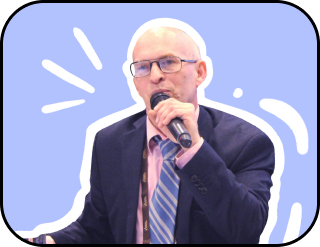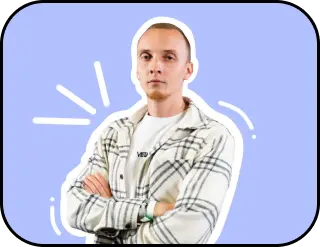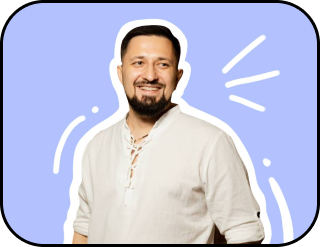“The eyes are blind. One must search with the heart.” Sergey Kiselev's inspiring journey
Sometimes it seems that the end of the world can only happen once and that we must prepare for it thoroughly, but life itself shows quite the opposite: the end of the world can be experienced several times in one lifetime, in every possible sense of the term.
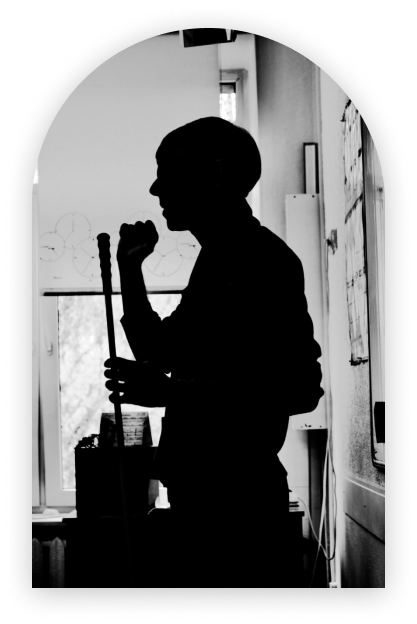
We are especially proud of the hero of this interview, even though we are speaking with an ordinary person. However, it is precisely he who gives hope that every person can triumph over the end of the world if they can triumph over themselves. Only a pair of dark glasses and enforced darkness separate our interviewee from the outside world, but this darkness once became the stimulus for his new life.
We spoke with Sergey Kiselev, the founder and head of the Association of Young Disabled People ‘Apparel’ and the creator of the unique format of transformational quests ‘In the Dark,’ about what ‘global trust’ means, how one can see with the heart what cannot be seen with the eyes, and how one can triumph over darkness.

— Sergey, so what is the world really like? Colorful or black and white?

— Oh, that’s an unexpected and philosophical question right away. Well, of course, it’s colorful. And it’s not about the color palette, but about the fact that people make the world, and people are all different. For example, I recently had a conversation with some guys who also live in darkness, and one of them said, ‘We were all united by a common tragedy.’ That really surprised me.

— Why?

— Do you remember the parable about the two monks and the girl? On their way back to their monastery, a young monk and his teacher saw a girl who couldn’t cross a dangerous mountain stream. Without hesitation, the teacher picked her up and carried her across. The young monk was silent the whole way, puzzled, but eventually, he couldn’t hold back and said, ‘Teacher, how could you do that? We monks are forbidden to even look at women, let alone touch them!’ To which the teacher replied, ‘I left that girl on the other side of the stream a long time ago, but you are still carrying her.’
At that moment, I had a similar feeling; I realised how far I had moved on from this, while they were still there. And it’s not about me, about how good or special I am. It’s about choice, about how long each of us will carry our attitude towards something, just like the girl in the parable. I was surprised at how long I hadn’t thought about it. Some kind of tragedy… I have no time for that. I know I’m not saying anything supernatural now, but why waste resources on what you cannot change, when you can use that energy on what you can change.
A good friend of mine once told me that he could never catch me at home because the light in my windows was never on, and then he suddenly stopped himself. I don’t see the world as it could be seen, but that doesn’t mean I don’t see it. And it really is colorful.

— Alright, Sergey. Then I have another question: what does darkness teach you?

— That’s a good question as well. I wouldn’t say that darkness teaches anything; it’s not a lesson you need to learn and pass. Rather, it reveals things.

— Darkness reveals?

— Yes. In darkness, everything becomes sharper, and you are constantly left with yourself, without external distractions. And when you face yourself, everything is laid bare at once: all your fears, all your expectations of yourself, of the world, of people. Before this moment, I had no idea how many expectations I had! How much judgment we have inside, and how often we ask ourselves, ‘What will people think of me?’ But do we even need to worry about that? We’ve all heard motivational speeches about how you have only yourself to rely on, but at certain points in life, we realise that this kind of motivation doesn’t work. And here, in the darkness, you can’t get away with that. Because you could spend your whole life waiting for someone to come and take you, for example, on a walk. Or, you could get up and walk down the street yourself, or catch a bus and go to another city.

— And I imagine darkness sharpens the imagination too, doesn’t it?

— Yes, definitely. I go to Altai every year as a volunteer, but I’ve never seen it. It’s a special land where the design is created by nature itself. God and the heavens created it. And I like to immerse myself in it, to project myself into that space. It brings different sensations, meaning I perceive the entire region, all its nature, in my own way, not visually. You understand that in front of you might be a mountain or a woman, but what matters is the presence, and everything else is perceived differently.
A person born blind doesn’t know what color a tomato is or what color grass is, but such a person can easily tell the difference between a juicy tomato and a rubber one, or walk barefoot on the grass. Because they experience the world differently, through taste and tactile sensations. And that is also a diverse palette, just a different one. It turns out that a person focuses on other qualities of the tomato, its taste. And they value the essence of the tomato more — its flavour profile — than its visual appearance. That’s what matters! After all, you can’t see everything with your eyes, because you need to feel it. Although many people can also meditate on a pile of tomatoes of different colors.

— “The eyes are blind. One must search with the heart.”

— Exactly! Among the people I know, there are couples where the partners have never seen each other. And these are strong relationships. What attracted these people to each other? It’s what they are filled with, their essence. Every day they admire one another, discovering new facets, but it has nothing to do with visual admiration. It’s neither good nor bad — it’s a certain skill that can be gained even outside of darkness.

— So it turns out that visual perception can sometimes even get in the way.

— It can. But visual perception itself can also be interpreted in different ways. Darkness makes everyone equal. For instance, for some people, it might be really important to be driven around in a certain class and year of limousine, but we don’t see that. We understand that we are in a car, we feel good, pleasant, and comfortable, and the rest doesn’t really matter. If someone offered me their hand as I got off the bus, it doesn’t matter to me who did it, their age, gender, or social status. What matters to me is that the person wasn’t afraid to offer their hand, and everything else is secondary.

— Sergey, I just had a thought that the quote from The Little Prince by Antoine de Saint-Exupéry, “The eyes are blind, one must search with the heart,” can be read in the context of emotions.

— I agree with you. Many specialists in various fields say, “First come emotions, then comes the economy, and then everything else.” The moment we start overthinking something, skepticism sets in, and that’s when emotions end. The same goes for skeptical external assessments or a skeptical attitude toward circumstances.
I don’t even know what other life events can shake and reorient a person as much as losing their sight. Not just in terms of lifestyle, but in terms of all principles and attitudes toward oneself. And in terms of trust as well. Trust is also an emotion, but here’s the question: emotions towards what? Towards people or towards oneself? The state of trust is also just an emotional state. By the way, what do you think a person living in darkness cannot leave the house without?

— Interesting, without what?

— Without trust. Global, sometimes forced, all-encompassing trust in everything. In the world, in people, in circumstances, in the weather. In the darkness, just like in regular life, nothing can be controlled, and it’s not necessary. I’ve long stopped counting my steps; I can manage without guides. I hear cars behind me, but I have no idea who’s driving them — whether the driver knows the traffic rules and understands they shouldn’t drive onto the sidewalk. At this moment, I trust them. You have to trust; otherwise, you can’t leave the house.
In general, if you trust life itself, you have fewer expectations. That’s probably what I’d like to convey to everyone. It doesn’t matter what has already happened or what might never happen. Either way, it will be hard — there will be suffering, acceptance, and philosophical questions you ask yourself. And I’m not just talking about darkness. If something happens to you that you weren’t prepared for, but there’s at least a small spark of desire, motivation, or drive within you, you will overcome it. That spark will always be your guide, starting small, but then growing into a real taiga bonfire that will shine not only for you but for everyone around you.

— Sergey, thank you so much for this revelation. I really hope that people won’t have to come to such an understanding through pain.

— I completely agree with you. Why come to something through pain? Why come to trust through extraordinary situations? If you can just stop, not be forced, let go of all the unnecessary things, and simply glide?
We are all human, and it’s completely normal that the thought of losing something will always scare us. Even if I were to ask any person to imagine that they’ve lost something — how can you even imagine that? As mathematicians say, ‘Assume that’… but it’s impossible to assume. And this, too, is about a lack of trust. Different people come to trust through different experiences. For example, I have a very good friend who, some time ago, just left — he grabbed his coat and boots and went to Siberia, to a monastery, as a simple labourer. He stayed there for six months and came back in the spring. Stories like that, I think, teach us a lot. And it’s not about disabilities — it’s about trust in everything, because you can just leave, not being afraid to lose your place or income.
This is a different format and different, simple, ordinary conditions. This is diversity, and this is trust. It seems genuine: when you approach all the circumstances of life, all situations, all spaces, and all interactions with a very broad and open mind. That’s what’s valuable to me. It inspired me, somehow. That’s what interests me. The world, in any case, will not change, but something inside you will.

— And was that decision also, in some way, a forced one?

— Maybe so. I remember hearing an interview with a theatre figure who talked about how they were doing theatrical performances in Malta with their troupe. He said that in a town of 30,000 people, there were three theatres, and the troupe’s job was to do several performances a day to showcase the beauty of theatrical art to local fishermen. The schedule, of course, was very tight, and the actors had to perform almost without breaks. Naturally, this suited the local theatre administration, but it didn’t suit the actors. The administration directly asked the actors, ‘Why do you need so many breaks between performances? A whole three hours?’ To which the interviewee calmly replied, ‘An hour to eat, an hour for sex, an hour to sleep.’
Do you understand? The life of a modern person is not like that; we have to do everything in a rush — read on the go, eat on the go, take action on the go. There’s no time for self-reflection. Sometimes, you need to take a pause, just to be silent, to listen, or to allow yourself to feel something new, to let it in. Some might call it trust, others might call it self-care. But life doesn’t end at a particular circumstance or limitation.
Would you like me to show you how trust works?

— Of course!

— You know that I travel a lot as a volunteer and have been teaching kindness lessons in schools for many years. One day, a nice warm day, I decided to walk home; I wanted to enjoy the fresh air and take a route unfamiliar to me. So I’m walking with my cane, passing one street, then another, turning onto the street that leads to my home, and I approach the gate. I put my hand on the handle that opens the gate and walk through. How is this possible? I didn’t count my steps; I didn’t specifically look for the handle; I didn’t stop or feel the gate. I was lost in my thoughts and just took it and opened it.
How did I do that? I don’t know. Of course, one could say that I have some supernatural abilities or chalk it up to something more scientific. I’m an ordinary person, and I can’t explain it. But it’s a fact that happened to me. This is precisely an element of zero balance, most likely. When you walk, you’re ready for anything. You give trust, and your cup is empty. What comes in, you accept without much thought, and then a comprehensive perception emerges. So comprehensive that you seem to delve into the essence: the essence of a person, the essence of nature, the essence of an event, the essence of a conversation partner, the essence of space.

— This is a very interesting story, Sergey! It shows that the human resource is actually inexhaustible, and with it, you can open any door that appears and move forward. Thank you very much!

— Very metaphorical and very truthful.

— Sergey, you mentioned that you teach kindness lessons in schools. Please tell us what happens in such lessons?

— I conduct these lessons with high school students. We watch a short video, discuss it, then move on to the topic of health violations: I introduce the students to truthful statistics, talk about the causes of disabilities, and so on. After that, we transition to interactive activities, games, and elements of limitation, where children try to do something in a limited format. Then the children share their discoveries with their classmates.

— Sergey, you just used a very important word: ‘Discovery.’

— Yes. It’s as if the children are getting to know themselves anew and discovering new possibilities of their bodies. And all of this is done in a playful manner. The goal of the kindness lessons is very complex: to teach tolerance to any life circumstances and to show that one can live in any format. To demonstrate that we are all diverse, and the value of civilisation lies in our diversity. For example, I live in darkness, but I am just as much a person as you are, and my goals are ordinary; it’s just that my path to achieving them is different.

— This is very interesting. Do you practice anything similar for adults?

— Of course. I conduct quests ‘in the dark.’

— Please tell us what happens during such quests?

— It’s very simple: we meet with a group of people at a designated place in the city. Upon meeting, I give each of them a thick black blindfold, a cane, and pocket money, just enough to buy a bus ticket. Then, we set off.

— And this is where trust and even acceptance begin to work.

— Absolutely right, and many other things become heightened as well. For example, no matter what we are told, a person is structured in such a way that they can only focus on one thing at a time. When you need to focus on the space around you, other things, like how you are perceived by those around you, fade into the background. People start to hear the world differently and focus on sounds they hadn’t noticed before. Moreover, people become intrigued. Things that previously held no significance, like a stone lying in the road, now have fundamental importance, while other things fade into the background. The company on such a walk is important in terms of conversation and sharing experiences, but it’s not important in terms of external judgments. And you also see the friends you came with in a different light: it turns out that some have support, resourcefulness, and courage, while others do not. Some have warm hands, while others, on the contrary, hide their hands in their pockets.
That’s how we travel, until travellers get bored — well, yes, that can happen, so what?

— Sergey, what if it were the other way around? What could you learn from us?

— Oh, what a question. Perhaps you could teach me to live with something I have been protected from for many years — to live amidst informational noise. I have become so accustomed to the fact that there is nothing superfluous in my life that I would really need to relearn how to perceive visual information, which is presented in vast quantities and is very difficult to balance.
It would also be interesting to see the people I have communicated with and coexisted with for many years.

— Sergey, thank you very much for this wonderful and very candid interview. I would like to ask you one more question. What do you dream of?

— I would probably like there to be more kindness in the world, not forced kindness, but kindness as a choice. And for there to be more trust in the world, not as a means to achieve one’s goals, but trust as a source of inspiration.
I hope that people stop cleaning the world of darkness and start turning more towards the light, and that we all pay attention to the things that truly matter.
No one has ever lost their legs by giving up their seat to someone on public transport. No one has become impoverished by giving a little change to an elderly person. You can save the entire world from hunger by saving a cat and her three kittens from hunger. Sometimes a smile is warmer than a flame, and with words, not just actions, you can save someone’s life.
I hope we all remember this more often, and then the world will become even more colorful.
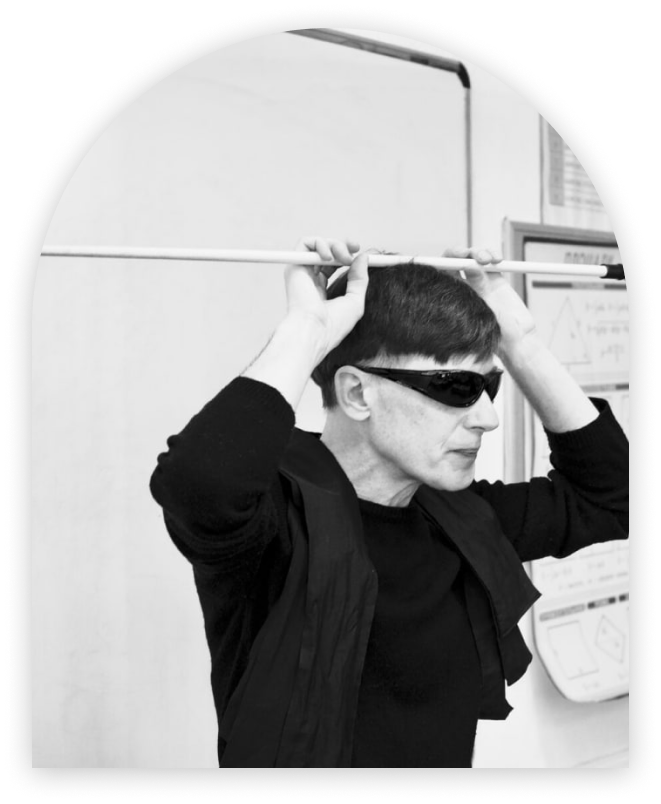
While living organisms undergo translocation, deletion, and duplication, we offer scientific knowledge without mutations – only useful discoveries and theories.
Thank you!

Similar articles | Individuals
